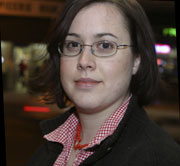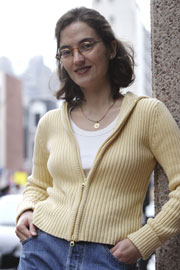
 |

|
|
 |
|
|
|||
|
Photo by Andrew Dobrowolskyj |
Manon Daisomont's son fuelled her ambition Manon Daisomont, an honours psychology graduate, is one of 20 people
who has been accepted into McGill’s speech therapy program. She hopes
to work in the school system as a speech therapist. She received little encouragement from the first universities she called.
Then she called Concordia. “The support was incredible,” she
said. “Every time I had an obstacle, Brigeen [Badour, Mature Student
Advisor] had a solution.” Since then, Daisomont has bonded with her fellow students and professors,
especially this last year, when the rigours and intimacy of the honours
psychology program forged the 14 students into a tight, supportive group.
“I’m really sad to be leaving Concordia,” she said. “I’ll
miss the personal aspect, but I’m excited about this coming year.”
|
|
|
 Anna Sheftel Photo by Andrew Dobrowolskyj |
Linguist Anna Sheftel is
going to Oxford Although she admires Montreal’s multiculturalism, especially after
seeing terrible examples of segregation while abroad, she finds helping
immigrants and social work in Quebec frustrating. “There’s lack
of money and lack of support. It makes me want to work at a higher level.” She may well do so, though her future career is uncharted. Non-governmental
organizations? Academia? The UN? Any of these is possible, but right now
she’s focused on the next step, Oxford. - Scott McRae |
||
 Cristina Juristo Photo by Andrew Dobrowolskyj |
Cristina Juristo won top
co-op translation award Four years later, Juristo has been awarded the Mary-Coppin Award from
OTTIAQ (the Ordre des Traducteurs, Terminologues et Interprètes aggrées
du Québec). This prize is presented annually to the best graduating translation
student in Quebec. With her good marks and success in difficult work terms, Cristina was
in every way the ideal candidate. Employers have commented on the excellence
of her syntax, her rich vocabulary and the quality of her research. Mary Coppin, a translator who gave the money for the prize, will present the award at the fall convocation ceremony, because Cristina had already made arrangements to travel and could not attend her graduation ceremony in June. - Sabrina Crespi |
||
|
|
Christina Hétu's
BA is a personal triumph Hétu, now wearing her wavy dark hair tied back, said that her
parents inspired her to persevere. Father Edmond Sr. retired early to
care for her and the lives of mother Lena and Edmond Jr. revolved around
her. A practising Catholic, she also found solace in her faith. Before falling ill, Hétu had volunteered in several local hospitals.
In the past three years, she got to know hospitals from a patient’s
perspective. She attempted to complete her two missing courses during
a period of remission in 2001, but the cancer returned. The illness made
her drowsy and she had difficulty concentrating. Subsequently, she endured
the strongest treatment yet and lost her hair. Hétu is currently applying for jobs as an economics researcher
or editor. She talked excitedly about beginning salsa lessons, painting
and getting her driver’s license. She also hopes to start a private
counselling service on the side. |
||
 Photo by Dahlia Liwsze |
Mission to Belize As soon as their exams were over, Edward Joseph (left) and Kristopher
Gibbs (right) went with 10 other students from Concordia and McGill on
a Christian mission to Belize. The small Central American country is still
feeling the effects of Hurricane Iris, which left 15,000 people homeless
in October 2001.
|